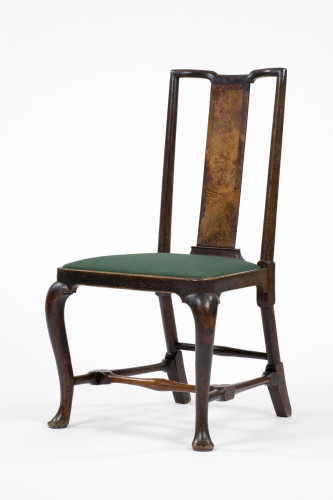14/2006
Collection
Furniture
Brief description
Walnut India-back chair, the pair to 14/2006-1 which bears part of a trade label of William Old and John Ody, chair makers and retailers of St Paul's Churchyard in the City of London, c. 1725.
Object name
chair
Object number
14/2006
Production organisation
William Old and John Ody (manufacturer and/or retailer)
Production date
c.1725 (manufactured)
Production place
London (manufactured)
Period
Georgian (1714-1837)
Material
walnut
wool
beech
walnut veneer
varnish
wool
beech
walnut veneer
varnish
Technique
joined
carved
turned
hand written
inscribed
stamped
veneered
tenoned
glued
nailed
pegged
applied
varnished
carved
turned
hand written
inscribed
stamped
veneered
tenoned
glued
nailed
pegged
applied
varnished
Physical description
Walnut chair, with a yolk top rail over a rectangular splat between turned posts. The drop-in seat is raised on cabriole legs with turned stretchers. Inside the back rail in blunt pencil, the number ‘1’ is inscribed with a circle round it. The rebate on the front rail is marked I (1 in Roman numerals) and the back of the seat rail is stamped ‘RR’.
The chair is made from solid walnut, except for the splat which is walnut veneered onto beechwood. The top rail is morticed onto the back posts. The splat is veneered with figured walnut, cross-banded with walnut, and tenoned up into the top rail and into the shoe. This is framed with a band of figured walnut. The shoe is glued directly down onto the rear seat rail. The rails are tenoned into the legs and are rebated to accept the drop-in seat. All the joints are pegged with a single peg. There are supporting blocks nailed to the rails at the joint with the back posts. The shaped brackets at the tops of the legs are thicknessed with glued additions. The exposed endgrain on the tops of the legs is concealed with an applied facing of walnut, which extends across the joint on the front and side rails. The stretchers are tenoned all round, except the back stretcher which is doweled.
The whole chair is covered in a thick semi-opaque brown varnish, which is not original. It is heavily patinated in places with ecretions of dirt and wax. It is relatively lightly patinated in areas of high wear, such as the splat, seat rails and stretchers. There is some worm infestation to the beechwood splat. There are breaks to the leading edge of the shoe. The supporting blocks at the back of the seat rails appear to be original, with original nails. There is a repaired break to top of the left front leg. The mouldings across the joints above the corners are probably replaced. All the pegs appear to be original.
The chair is made from solid walnut, except for the splat which is walnut veneered onto beechwood. The top rail is morticed onto the back posts. The splat is veneered with figured walnut, cross-banded with walnut, and tenoned up into the top rail and into the shoe. This is framed with a band of figured walnut. The shoe is glued directly down onto the rear seat rail. The rails are tenoned into the legs and are rebated to accept the drop-in seat. All the joints are pegged with a single peg. There are supporting blocks nailed to the rails at the joint with the back posts. The shaped brackets at the tops of the legs are thicknessed with glued additions. The exposed endgrain on the tops of the legs is concealed with an applied facing of walnut, which extends across the joint on the front and side rails. The stretchers are tenoned all round, except the back stretcher which is doweled.
The whole chair is covered in a thick semi-opaque brown varnish, which is not original. It is heavily patinated in places with ecretions of dirt and wax. It is relatively lightly patinated in areas of high wear, such as the splat, seat rails and stretchers. There is some worm infestation to the beechwood splat. There are breaks to the leading edge of the shoe. The supporting blocks at the back of the seat rails appear to be original, with original nails. There is a repaired break to top of the left front leg. The mouldings across the joints above the corners are probably replaced. All the pegs appear to be original.
Dimensions
Depth: 58cm
Height: 101.5cm
Width: 56cm
Height: 101.5cm
Width: 56cm
Website keywords
seating
Label
Label text for ‘A taste of China’ case, Information Bay 3, Geffrye Museum, 2010:
Chair, about 1725
Walnut
Chairs with this type of back were known at the time as ‘India-back’ chairs.The term ‘India’ was used as a general description for all parts of Asia, and in this case the form was inspired by Chinese chairs (see illustration).The chair bears the trade label of William Old and John Ody, furniture makers in St Paul’s Churchyard, one of the main centres of the
furniture trade in London.
Purchased with the assistance of The Art Fund and the MLA/V&A Purchase Grant Fund
Chair, about 1725
Walnut
Chairs with this type of back were known at the time as ‘India-back’ chairs.The term ‘India’ was used as a general description for all parts of Asia, and in this case the form was inspired by Chinese chairs (see illustration).The chair bears the trade label of William Old and John Ody, furniture makers in St Paul’s Churchyard, one of the main centres of the
furniture trade in London.
Purchased with the assistance of The Art Fund and the MLA/V&A Purchase Grant Fund


















